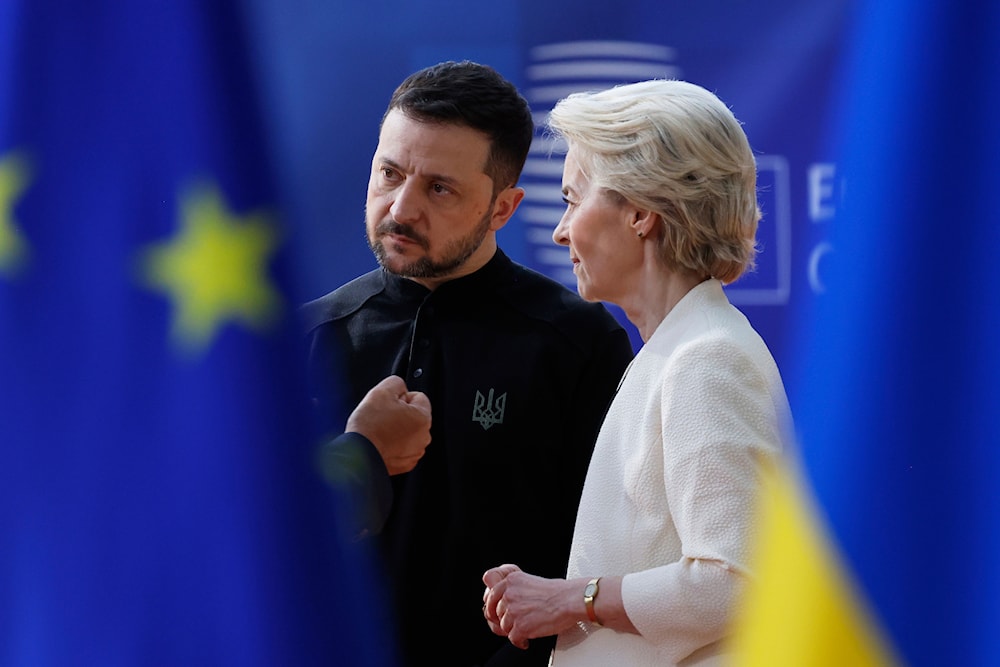EU capitals argue over more military aid to Ukraine: FT
The Financial Times reports EU nations are split on a formal Ukraine aid target, as major economies hesitate to commit despite Russian advances and Kiev’s weapon shortages.
-

European Council President Antonio Costa, left, hidden behind a flag, speaks with Ukraine's President Volodymyr Zelensky, center, and European Commission President Ursula von der Leyen as they arrive for an EU Summit at the European Council building in Brussels, Thursday, March 6, 2025. (AP)
A new Financial Times report by Henry Foy has discussed why European capitals aren’t willing to agree on a formal target for Ukraine aid.
Foy starts off from the premise that foreign investors, hedge funds, and brokers are returning to trade Russian bonds and the rouble, betting that Donald Trump’s improved relations with Vladimir Putin will lead to a surge of capital flowing back into Russia's economy.
So why aren't EU nations agreeing on a formal target for Ukraine aid?
In 2024, the EU delivered approximately €20 billion in military aid to Ukraine. Despite US-led peace talks aiming for a swift ceasefire, Russian forces are still advancing in eastern Ukraine, while Kiev faces a critical shortage of weapons, especially artillery and air, and missile defense systems.
As mentioned in the report, EU diplomats have been in disagreement for weeks over a proposal by the bloc’s chief diplomat, Kaja Kallas, to set a target for collective military aid to Ukraine this year. The 27 national foreign ministers are meeting on Monday in Brussels, likely to continue the debate.
The main obstacle to Kallas’ suggestion to at least match last year’s €20 billion, or ideally double it to €40 billion, is the reluctance of some larger countries to commit according to their economic size.
The disparity in support among EU nations is stark. While Germany, the EU’s largest economy, is its biggest military donor since the start of the war in Ukraine in February 2022, countries like Denmark, the Netherlands, and Sweden follow closely behind.
In fact, Denmark (with a population of 6 million and a GDP of €373 billion) has contributed more military aid to Ukraine than France, Italy, and Spain combined (with a population of 174 million and a GDP of €7 trillion).
EU nations to 'urgently' aid Ukraine
The report details that at a summit of EU leaders on March 6, all bar Hungary’s Viktor Orban signed up to the convoluted statement of "welcom[ing] the readiness of member states to urgently step up efforts to address Ukraine’s pressing military and defense needs."
The report states that this is part of a commitment to turn Ukraine into a “steel porcupine,” equipped with enough weapons to defend against future invasions. However, proponents of the Kallas plan argue that this goal can only be achieved if the capitals agree to fixed military support targets.
Read next: European nations weigh deployment of 30,000 troops to Ukraine: WashPo
“Everyone is happy to commit to ‘step up’ and to pledge unwavering support,” said one senior EU diplomat involved in preparations for today’s ministerial. “But many are not willing to commit to how.”
That said, during Friday's ambassador meeting, two-thirds backed Kallas's plan. She aimed to gain more support today before the debate continues at Thursday's leaders' summit.
Moreover, Europe has saved hundreds of billions annually in recent decades, but that era is ending.
$21 billion Ukraine aid suggestion scrapped
Earlier this month, European Union foreign policy chief Kaja Kallas' suggestion to send Ukraine a massive aid package has been removed from the draft of the final statement of the upcoming EU summit on Ukraine, according to Euractiv on March 4.
The final draft of the statement did not mention Kallas's proposal of a 20 billion euro ($21 billion) aid package for Ukraine and instead called member states to "review work done on the delivery of military support to Ukraine."
The statement also urged member states of the European Union to step up efforts "in particular on the delivery of air defense systems, ammunition, and missiles, as well as on the provision of necessary training and equipment for Ukrainian brigades, as well as other needs that Ukraine may have."

 4 Min Read
4 Min Read









